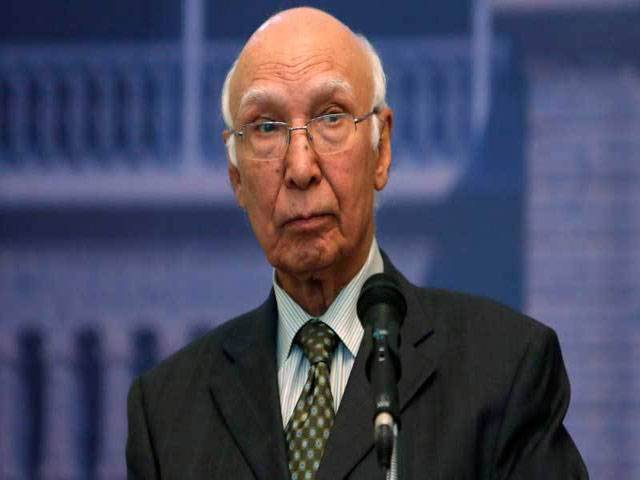ISLAMABAD - Pakistan yesterday said that permanent peace could be light years away in South Asia if the decades-old Kashmir issue was not resolved.
Adviser to Prime Minister on Foreign Affairs Sartaj Aziz believed resolution of lingering Kashmir dispute was vital for peace and security in the region.
Briefing the Ambassadors of P-5 and EU countries here, he said that peace was interlinked with the solution to the key dispute with India and New Delhi was reluctant to hold talks on the issue.
Sartaj Aziz’s comment came a day after India refused another offer from Pakistan to hold talks on Kashmir.
Responding to a letter by Foreign Secretary Aizaz Ahmed Chaudhry, his Indian counterpart S Jaishankar insisted that India will only discuss ‘cross-border terrorism’ which was its ‘core concern.’
An earlier letter from Chaudhry this month also received an identical reply from Jaishankar.
Sartaj urged the international community to play its role to stop Indian forces blatant human rights violations in Occupied Kashmir.
The Adviser said the Indian refusal for talks on Kashmir dispute was regrettable.
He deplored the brutal use of force by Indian troops on defenceless Kashmiri people. He said this had claimed the lives of 80 Kashmiri people.
Sartaj said that Pakistan was not shying away from dialogue with India and wanted all issue to be resolved on the negotiations table.
The Adviser said it was India who did not want to come to dialogue table due to its weak position on Kashmir.
“India should come forward and do not escape from talks,” he said and added, since many years it was India who is not interested in starting dialogue.
Foreign Office spokesman Nafees Zakaria said that India was trying to divert world’s attention from the atrocities being perpetrated by Indian forces in Occupied Kashmir by blaming Pakistan of supporting terrorism.
“India cannot crush the indigenous movement of Kashmiris for their right to self-determination in light of the UN Security Council's resolutions by using brute force against them,” he said.
Analyst Pervaiz Iqbal Cheema said that the international community was aware of the fact that India was involved in terrorist activities in Pakistan.
He said that India wanted to divert the attention of the world from the prevailing situation in Held Kashmir.
“India wants to declare the movement of Kashmiris for their right to self-determination a terrorist movement but it is not so. Indian anti-Pakistan policies have failed in Balochistan as majority of the separatists surrendered before the government.
United States has its national interests with India so it is silent over Indian involvement in Pakistan.
Pakistan has done a wise thing by inviting India to resolve Kashmir dispute through dialogue at any forum,” he added.
Meanwhile, officials at the Foreign Ministry said Islamabad was disappointed with the US State Department statement that Pakistan needed to deny safe havens to extremists.
Earlier, Director, Press Office at the US State Department, Elizabeth Trudeau said the US encouraged the governments of Pakistan and Afghanistan to increase their cooperation to counter terrorism.
She added the US had consistently raised concerns to the highest level of the government of Pakistan on the need to deny ‘safe havens’ to extremists. “We have pressed the government of Pakistan to follow up on their expressed commitment, their stated commitment, to not discriminate among terror groups regardless of their agenda or affiliation,” she said.
Soon after the attack on the American University in Kabul, Chief of Army Staff Raheel Sharif telephoned Afghan President Ashraf Ghani and strongly condemned the terrorist strike that killed 16 people.
A military statement said: “COAS said Pakistani soil would not be allowed to be used for any type of terrorism in Afghanistan.”
Afghan authorities shared with Pakistan three mobile numbers claiming that users of the numbers were in contact with attackers, it added.
“Based on the cell numbers, Pakistan Army carried out a combing operation in suspected area close to Pak-Afghan border to verify presence of miscreants, and found that all SIMs were from a network owned and operated by Afghan company whose spill over signal affects some areas along Pak-Afghan border,” the statement said.
The previous day, Pakistan complained to the US against its indifference and halting of aid money. In a meeting with Special Assistant to President Barrack Obama and Senior Director for South Asian Affairs Peter Lavoy, Foreign Secretary Aizaz Ahmed Chaudhry protested that the US did not acknowledge Pakistan’s efforts against terrorism despite the country’s commitment to wipe out the menace. Also, Pakistan warned Afghanistan against becoming facilitator of India’s anti-Pakistan conspiracies.
A senior official at the Foreign Ministry said the US was showing its tilt towards Afghanistan and India by speaking their language. “As the Foreign Secretary said that the US should play neutral. We are also their allies and have been fighting terrorism more than anybody else,” he maintained.
The safe havens term, he said, was an allegation by Afghanistan and India which only created doubts about Pakistan’s commitment to eliminate terrorism. “We will never allow our soil to be used against any other country,” he added.






